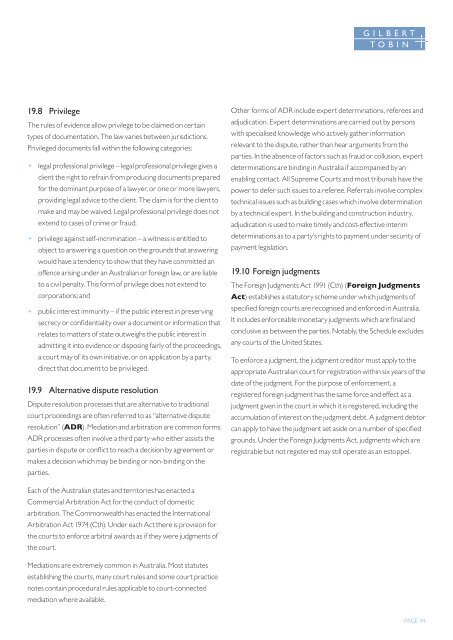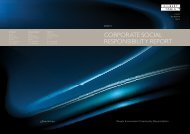Gilbert + tobin - Gilbert and Tobin
Gilbert + tobin - Gilbert and Tobin
Gilbert + tobin - Gilbert and Tobin
You also want an ePaper? Increase the reach of your titles
YUMPU automatically turns print PDFs into web optimized ePapers that Google loves.
19.8 Privilege<br />
The rules of evidence allow privilege to be claimed on certain<br />
types of documentation. The law varies between jurisdictions.<br />
Privileged documents fall within the following categories:<br />
+ + legal professional privilege – legal professional privilege gives a<br />
client the right to refrain from producing documents prepared<br />
for the dominant purpose of a lawyer, or one or more lawyers,<br />
providing legal advice to the client. The claim is for the client to<br />
make <strong>and</strong> may be waived. Legal professional privilege does not<br />
extend to cases of crime or fraud;<br />
+ + privilege against self-incrimination – a witness is entitled to<br />
object to answering a question on the grounds that answering<br />
would have a tendency to show that they have committed an<br />
offence arising under an Australian or foreign law, or are liable<br />
to a civil penalty. This form of privilege does not extend to<br />
corporations; <strong>and</strong><br />
+ + public interest immunity – if the public interest in preserving<br />
secrecy or confidentiality over a document or information that<br />
relates to matters of state outweighs the public interest in<br />
admitting it into evidence or disposing fairly of the proceedings,<br />
a court may of its own initiative, or on application by a party,<br />
direct that document to be privileged.<br />
19.9 Alternative dispute resolution<br />
Dispute resolution processes that are alternative to traditional<br />
court proceedings are often referred to as “alternative dispute<br />
resolution” (ADR). Mediation <strong>and</strong> arbitration are common forms.<br />
ADR processes often involve a third party who either assists the<br />
parties in dispute or conflict to reach a decision by agreement or<br />
makes a decision which may be binding or non-binding on the<br />
parties.<br />
Other forms of ADR include expert determinations, referees <strong>and</strong><br />
adjudication. Expert determinations are carried out by persons<br />
with specialised knowledge who actively gather information<br />
relevant to the dispute, rather than hear arguments from the<br />
parties. In the absence of factors such as fraud or collusion, expert<br />
determinations are binding in Australia if accompanied by an<br />
enabling contact. All Supreme Courts <strong>and</strong> most tribunals have the<br />
power to defer such issues to a referee. Referrals involve complex<br />
technical issues such as building cases which involve determination<br />
by a technical expert. In the building <strong>and</strong> construction industry,<br />
adjudication is used to make timely <strong>and</strong> cost-effective interim<br />
determinations as to a party’s rights to payment under security of<br />
payment legislation.<br />
19.10 Foreign judgments<br />
The Foreign Judgments Act 1991 (Cth) (Foreign Judgments<br />
Act) establishes a statutory scheme under which judgments of<br />
specified foreign courts are recognised <strong>and</strong> enforced in Australia.<br />
It includes enforceable monetary judgments which are final <strong>and</strong><br />
conclusive as between the parties. Notably, the Schedule excludes<br />
any courts of the United States.<br />
To enforce a judgment, the judgment creditor must apply to the<br />
appropriate Australian court for registration within six years of the<br />
date of the judgment. For the purpose of enforcement, a<br />
registered foreign judgment has the same force <strong>and</strong> effect as a<br />
judgment given in the court in which it is registered, including the<br />
accumulation of interest on the judgment debt. A judgment debtor<br />
can apply to have the judgment set aside on a number of specified<br />
grounds. Under the Foreign Judgments Act, judgments which are<br />
registrable but not registered may still operate as an estoppel.<br />
Each of the Australian states <strong>and</strong> territories has enacted a<br />
Commercial Arbitration Act for the conduct of domestic<br />
arbitration. The Commonwealth has enacted the International<br />
Arbitration Act 1974 (Cth). Under each Act there is provision for<br />
the courts to enforce arbitral awards as if they were judgments of<br />
the court.<br />
Mediations are extremely common in Australia. Most statutes<br />
establishing the courts, many court rules <strong>and</strong> some court practice<br />
notes contain procedural rules applicable to court-connected<br />
mediation where available.<br />
PAGE 44







